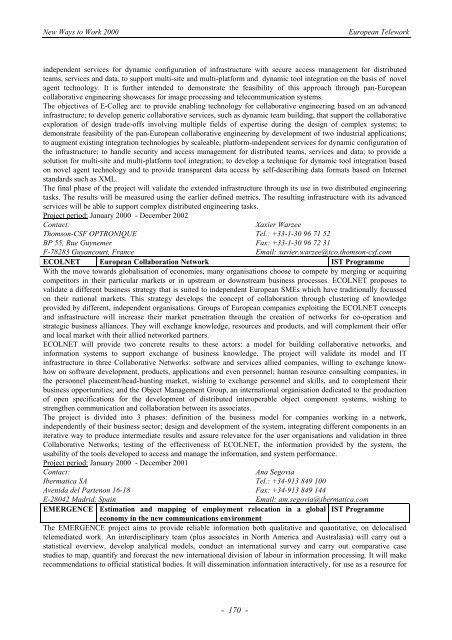eWORK 2000 - European Telework Week
eWORK 2000 - European Telework Week
eWORK 2000 - European Telework Week
- No tags were found...
Create successful ePaper yourself
Turn your PDF publications into a flip-book with our unique Google optimized e-Paper software.
New Ways to Work <strong>2000</strong><strong>European</strong> <strong>Telework</strong>independent services for dynamic configuration of infrastructure with secure access management for distributedteams, services and data, to support multi-site and multi-platform and dynamic tool integration on the basis of novelagent technology. It is further intended to demonstrate the feasibility of this approach through pan-<strong>European</strong>collaborative engineering showcases for image processing and telecommunication systems.The objectives of E-Colleg are: to provide enabling technology for collaborative engineering based on an advancedinfrastructure; to develop generic collaborative services, such as dynamic team building, that support the collaborativeexploration of design trade-offs involving multiple fields of expertise during the design of complex systems; todemonstrate feasibility of the pan-<strong>European</strong> collaborative engineering by development of two industrial applications;to augment existing integration technologies by scaleable, platform-independent services for dynamic configuration ofthe infrastructure; to handle security and access management for distributed teams, services and data; to provide asolution for multi-site and multi-platform tool integration; to develop a technique for dynamic tool integration basedon novel agent technology and to provide transparent data access by self-describing data formats based on Internetstandards such as XML.The final phase of the project will validate the extended infrastructure through its use in two distributed engineeringtasks. The results will be measured using the earlier defined metrics. The resulting infrastructure with its advancedservices will be able to support complex distributed engineering tasks.Project period: January <strong>2000</strong> - December 2002Contact:Thomson-CSF OPTRONIQUEBP 55, Rue GuynemerF-78283 Guyancourt, FranceXaxier WarzeeTel.: +33-1-30 96 71 52Fax: +33-1-30 96 72 31Email: xavier.warzee@tco.thomson-csf.comECOLNET <strong>European</strong> Collaboration Network IST ProgrammeWith the move towards globalisation of economies, many organisations choose to compete by merging or acquiringcompetitors in their particular markets or in upstream or downstream business processes. ECOLNET proposes tovalidate a different business strategy that is suited to independent <strong>European</strong> SMEs which have traditionally focussedon their national markets. This strategy develops the concept of collaboration through clustering of knowledgeprovided by different, independent organisations. Groups of <strong>European</strong> companies exploiting the ECOLNET conceptsand infrastructure will increase their market penetration through the creation of networks for co-operation andstrategic business alliances. They will exchange knowledge, resources and products, and will complement their offerand local market with their allied networked partners.ECOLNET will provide two concrete results to these actors: a model for building collaborative networks, andinformation systems to support exchange of business knowledge. The project will validate its model and ITinfrastructure in three Collaborative Networks: software and services allied companies, willing to exchange knowhowon software development, products, applications and even personnel; human resource consulting companies, inthe personnel placement/head-hunting market, wishing to exchange personnel and skills, and to complement theirbusiness opportunities; and the Object Management Group, an international organisation dedicated to the productionof open specifications for the development of distributed interoperable object component systems, wishing tostrengthen communication and collaboration between its associates.The project is divided into 3 phases: definition of the business model for companies working in a network,independently of their business sector; design and development of the system, integrating different components in aniterative way to produce intermediate results and assure relevance for the user organisations and validation in threeCollaborative Networks; testing of the effectiveness of ECOLNET, the information provided by the system, theusability of the tools developed to access and manage the information, and system performance.Project period: January <strong>2000</strong> - December 2001Contact:Ibermatica SAAvenida del Partenon 16-18E-28042 Madrid, SpainAna SegoviaTel.: +34-913 849 100Fax: +34-913 849 144Email: am.segovia@ibermatica.comIST ProgrammeEMERGENCE Estimation and mapping of employment relocation in a globaleconomy in the new communications environmentThe EMERGENCE project aims to provide reliable information both qualitative and quantitative, on delocalisedtelemediated work. An interdisciplinary team (plus associates in North America and Australasia) will carry out astatistical overview, develop analytical models, conduct an international survey and carry out comparative casestudies to map, quantify and forecast the new international division of labour in information processing. It will makerecommendations to official statistical bodies. It will dissemination information interactively, for use as a resource for- 170 -








